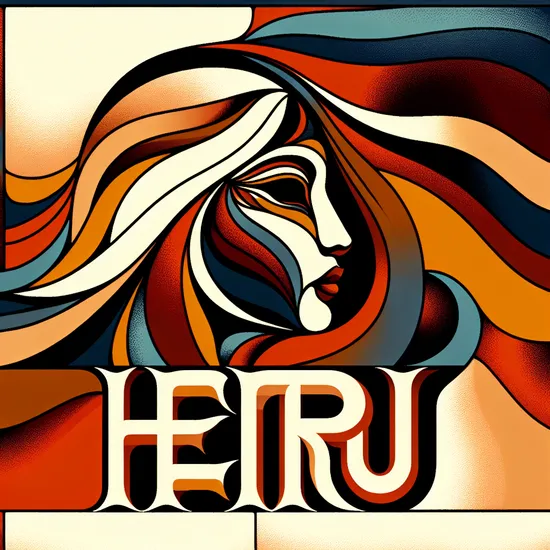Heru: Meaning, Origin, Popularity, and Related Names
Understanding the Meaning of Heru
The name Heru resonates with the mighty prowess and bravery often associated with warrior. Some interpretations even suggest it embodies victory or attributes of being strong and mighty. This symbolic representation links to various mythological and cultural insights reflecting attributes of strength and power.
Find more names related to the name Heru.
Warrior,
Victory,
Strong,
Egyptian,
Pronouncing Hirou in Egyptian
/ˈhɛru/ - هيرو
- /h/: pronounced like 'h' in 'hat'
- /ɛ/: pronounced like 'e' in 'bed'
- /r/: pronounced like 'r' in 'red'
- /u/: pronounced like 'oo' in 'book'
The name Heru is pronounced as 'Heh-roo', with an emphasis on the first syllable. The 'h' is a soft sound, like 'hat', and the 'roo' rhymes with 'boo'.
Unveiling the Origins of Heru
The name Heru has roots steeped in ancient mythology, primarily linked with Egyptian culture. It is notably connected to Horus, a god of war and sky in Egyptian mythology, highlighting its deep historical and cultural roots. This origin signifies a lineage of significance and mythical heritage.
Gender Neutrality of Heru
Heru is traditionally associated with the male gender but can also be used for both males and females. In Egyptian culture, it's predominantly male, yet in other regions, you might find it as a unisex name. Its gender versatility celebrates the dynamic attribute expressed through names in modern contexts.
Popularity of the Name Heru
The name Heru garners modest popularity in contemporary baby name charts across various regions, particularly in regions like Egypt. Its popularity has remained relatively stable with slight fluctuations, maintaining a niche appeal in modern contexts due to its ancient roots and associated mythologies.
Heru Across Cultures and Borders
Heru has diverse usage across different cultures. In Egypt, it is tied closely with historical and cultural contexts, while in other regions, it adapts to local pronunciations and forms. For instance, its significance in West African regions varies, yet its association with strong characteristics remains consistent.
| Global Distribution and Gender Ratio of the Name Heru |
| Country |
Usage % |
Female % |
Male % |
| ID |
95.66% |
1.72% |
98.28% |
| US |
1.96% |
0% |
100% |
| SG |
0.53% |
0% |
100% |
| MY |
0.37% |
0% |
100% |
| GB |
0.16% |
0% |
100% |
Analysis of gender and popularity by country is derived from data provided by
Gender API.
Traits and Characteristics Associated with Heru
- Brave : Bears the quality of courage and might, resonating with the historical attributes of Heru.
- Leader : Often seen in leadership roles, reflecting dominance and authority.
- Spiritual : Carries a spiritual significance, often linked with wisdom and introspection.
- Adventurous : Embodies an adventurous spirit willing to take on challenges.
Professional Inclinations of Individuals Named Heru
- Leadership Roles : Many gravitate towards positions of power and leadership where they can showcase their decision-making abilities.
- Creative Fields : Inclined towards creativity owing to imaginative and storytelling skills.
- Cultural Influencers : Due to a rich heritage background, they often engage in careers linked with culture and the arts.
Unique Attributes of the Name Heru
- Mythological Roots : Tied to the figure of Horus in Egyptian mythology, a god of the sky and war.
- Literary Influence : Featured in various ancient texts and mythologies, underscoring its philosophical and historical relevance.
- Symbol of Power : Viewed as a representation of strength and authority in cultural narratives.
Notable Figures Named Heru
- Heru Wibowo: Influential Indonesian business magnate and entrepreneur.
Similar Names
-
Horus: Similar in symbolic meaning of powerful and victory-related attributes linked with Egyptian mythology.
-
Ra: Shares a meaning in Egyptian culture symbolizing strength and power.
-
Osiris: Another Egyptian mythological name with meaning ties to leadership and strength.
-
Imhotep: Shares ancient roots, associated with wisdom and intelligence in Egyptian traditions.
-
Amon: Reflects strong characteristic traits, similar connotations in historical meanings.
-
Anubis: Known for meaning relating to dominance and leadership in mythological tales.
-
Set: Holds a dualistic nature in Egyptian lore with symbolic meaning of power.
-
Bastet: Associated with protection and nurturing, sharing cultural richness in its history.
-
Sekhmet: Tied to power and warlike attributes, parallels in mythological meaning.
-
Thoth: Deep meaning linked to wisdom and intelligence in Egyptian mythology.
